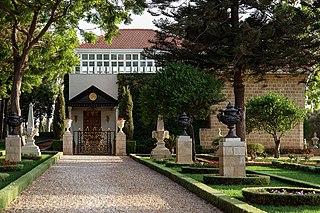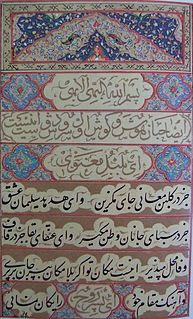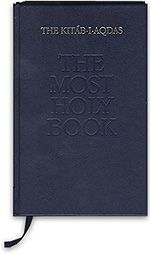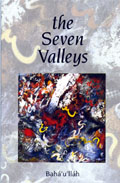| Texts and scriptures of the Bahá'í Faith |
|---|
 |
| From the Báb |
| From Bahá'u'lláh |
| From `Abdu'l-Bahá |
| From Shoghi Effendi |
Gleanings from the Writings of Bahá'u'lláh is a compilation of selected tablets and extracts from tablets by Bahá'u'lláh, the founder of the Bahá'í Faith. Shoghi Effendi, Guardian of the Bahá'í Faith from 1921 to 1957, made the selection and performed the translation, which was first published 1935.
A tablet, in a religious context, is a term used for certain religious texts.

Bahá'u'lláh, was a Persian religious leader, prophet and the founder of the Bahá'í Faith, which advocates universal peace and unity among all races, nations, and religions.

The Bahá'í Faith is a religion teaching the essential worth of all religions, and the unity and equality of all people. Established by Bahá'u'lláh in 1863, it initially grew in Persia and parts of the Middle East, where it has faced ongoing persecution since its inception. It is estimated to have between 5 and 8 million adherents, known as Bahá'ís, spread out into most of the world's countries and territories.
Contents
The work consists of "a selection of the most characteristic and hitherto unpublished passages from the outstanding works of the Author of the Bahá'í Revelation," according to Shoghi Effendi. [1] The passages come from the whole range of Bahá'u'lláh's writings, dated from about 1853 to 1892.
The book can be divided in five parts: [2]
- The "Day of God" (sec. 1-18)
- The Manifestation of God (sec. 19-69)
- The soul and its immortality (sec. 70-99)
- The World Order and the Most Great Peace (sec. 100-121)
- The duties of the individual and the spiritual meaning of life (sec. 122-166)
Among others, passages from the following works are included:

The Epistle to the Son of the Wolf is the last major work of Bahá'u'lláh, founder of the Bahá'í Faith, written in 1891 just before his death in 1892. It is a letter written to "the son of the Wolf," Shaykh Muhammad Taqi known as Áqá Najafi (1846-1914), a Muslim cleric in Isfáhán, where his family was the most powerful clerical family. Bahá'u'lláh called the father, Shaykh Muhammad Báqir (1819-1883), the Wolf because of his responsibility for the execution of the Nahrí brothers in Isfahan in 1879. The father and son were known for their persecution of the Bahá’ís.

The Hidden Words is a book written in Baghdad around 1857 by Bahá'u'lláh, the founder of the Bahá'í Faith. This work is written partly in Arabic and partly in Persian.

The Kitáb-i-Aqdas or Aqdas is the central book of the Bahá'í Faith written by Bahá'u'lláh, the founder of the religion, in 1873. The work was written in Arabic under the Arabic title al-Kitābu l-Aqdas, but it is commonly referred to by its Persian title, Kitáb-i-Aqdas, which was given to the work by Bahá'u'lláh himself. It is sometimes also referred to as "the Most Holy Book", "the Book of Laws" or the Book of Aqdas. The word Aqdas has a significance in many languages as the superlative form of a word with its primary letters Q-D-Š.
In addition, works partially translated in Gleanings were published more completely in the following compilations:
- The Summons of the Lord of Hosts
- The Tabernacle of Unity
- Tablets of Bahá'u'lláh Revealed After the Kitáb-i-Aqdas

The Summons of the Lord of Hosts is a collection of the tablets of Bahá'u'lláh, founder of the Bahá'í Faith, that were written to the kings and rulers of the world during his exile in Adrianople and in the early years of his exile to the fortress town of Acre in 1868. Bahá'u'lláh claimed to be the Promised One of all religions and all ages and summoned the leaders of East and West to recognize him as the promised one. The Summons of the Lord of Hosts is the printing of five distinct tablets of this material.

The Tabernacle of Unity is a small book, first published in July 2006, containing Bahá'u'lláh's Tablet, from the early `Akká period, to Mánikchí Ṣáḥib, a prominent Zoroastrian, and a companion Tablet addressed to Mírzá Abu'l-Fadl, the secretary to Mánikchí Ṣáḥib at that time.
The book was published without a list of which passages were derived from which works of Bahá'u'lláh, but such a list has been reconstructed subsequently and is on the web. [3]
Because of its broad selection, Gleanings is one of the first works of Bahá'u'lláh many people read. Rúḥíyyih Rabbání, Shoghi Effendi's widow, called it "a magnificent gift" to the Western Bahá'ís. [4] Queen Marie of Romania wrote that "even doubters would find a powerful strength in it, if they would read it alone, and would give their souls time to expand." [4] The work has been translated into many languages.

Marie of Romania, also known as Marie of Edinburgh, was the last Queen of Romania as the wife of King Ferdinand I.





